Why do puppies eat poop? While puppies tend to eat many strange things, poop-eating is one of the most repulsive. Some puppies don't discriminate when it comes to poo they're willing to eat, whether it's their own or another animal's feces.
Although many puppies grow out of this phase, there are steps you can take to discourage and even stop the behavior. Here are some possible reasons why your puppy is eating poop and what you can do about it.
Watch Now: Why Do Some Puppies Eat Poop?
Why Do Puppies Eat Poop?
Puppies may eat poop for several reasons, including behavioral and medical issues. They may eat their own or another animal’s droppings; there's even a technical term for it: coprophagia. Here are some possible explanations for your puppy's poop-eating:
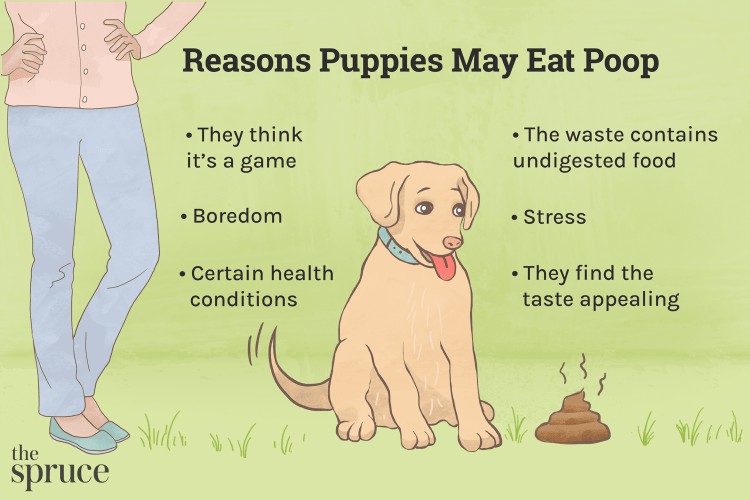
The Spruce / Melissa Ling
Imitating Mother
Eating poop is typically normal for very young puppies, possibly to colonize the gastrointestinal tract with normal bacteria. Puppies may learn this behavior while imitating their mother, who normally eats the feces of her nursing puppies to keep the area clean and avoid attracting predators. Generally, female dogs will stop eating their puppies' bowel movements around the time of weaning, but some pups might continue to dine on droppings. The good news is that most puppies outgrow the habit. The bad news is that some dogs hang on to the nasty practice throughout their lives.
Playing or Boredom
Your puppy may think it's a game when you wave your hands, shout with disgust, and chase them all over the yard in an attempt to discourage them from eating poop. Chasing can reward the behavior and encourage your puppy to play poopy-keep-away.
Other times, poop-eating stems from boredom. If a pup left out in the yard alone has little to occupy their time, they may turn to the one available thing to play with.
It Tastes Good
Eating stool may have to do with taste, especially if it's from another animal. Cow and horse manure may contain undigested grains or other ingredients that appeal to your pup. Cat poop is especially attractive to dogs, perhaps due to feline high-protein diets. This can be what makes the cat’s litter box seem like a puppy snack bar!
Seeking Attention
It's no secret that puppies love attention. If you react to poop-eating by making a big deal out of it, your puppy may see this as another way to gain your attention. Puppies can't always tell they're being scolded, so of any kind punishment can increase the unwanted behavior.
Nutritional Issues
Poor quality diets may lead to puppies snacking on their waste to try and make up for a nutritional deficiency. It's also possible that the puppy is not eating enough and their daily food intake needs to be increased. If food is not being digested fully, the puppy may look to its feces as a supplement because it's nearly the same as when it was eaten. Another possibility is that a puppy with a heavy infestation of worms eats their poop in an attempt to make up for the nutrients lost to the parasites.
Health Conditions
Some health issues may cause coprophagia as well. Diseases in the small intestine or pancreas may cause malabsorption or maldigestion. Also, conditions such as diabetes and hypothyroidism often increase a dog's appetite, so they may resort to whatever is available.
If your puppy isn't thriving despite eating a well-balanced diet, or shows other signs of illness, schedule an appointment with your veterinarian to be sure there isn't a health issue at play.
Stress
Stress can also lead a dog to eat their feces, especially major stressors like coming to a new home after being adopted. Puppies can also become stressed if they are harshly punished for poop eating. This can lead to a vicious cycle where the puppy associates poop with punishment, and eats the "evidence" in an attempt to stay out of trouble.
How to Stop Dogs From Eating Poop
It's best to put a stop to this behavior before it gets out of hand. Parasites and bacteria are easily transmitted through feces, so having a dog that eats it as a treat puts the pup's health at risk. There are several things you can do to put an end to this yucky habit:
Clean Up Poop
First things first, try to keep poop out of your puppy's reach. If they don't have access to poop, they may eventually stop being attracted to it. Pick up your dog's stools as soon as possible and check the yard for poop you missed (including other animals' feces). Dispose of the feces in a trash can with a tightly fitted lid so your pup can't scavenge the poop out of the garbage.
Restrict Access to Cat Litter
If you have a cat, place the litter box out of the dog's reach. If the cat doesn’t object, a covered litter box might deter the dog while allowing the cat access and privacy. Use a baby gate to keep the dog out of the cat’s domain. Some cats can jump over the standard gates, or you can install it a couple of inches off the floor so your kitty can slink underneath while the jumbo-size pup can’t get through.
Keep Your Pup On a Leash
Prevent access by walking your puppy on a leash and leading them away from the stool once their business is done. If your pup is dining on feces from neighborhood dogs or other animals, keep them on a close leash when out walking so they can't approach the poop. Remember to stay alert when walking with your puppy; dogs can be amazingly fast when they see something on the ground that they want to eat. Offer your puppy a reward when they leave the stool alone.
Train Your Puppy
Training is important for all pups and can help curb poop-eating.
- Teach your puppy to come when called and to sit and stay in front of you after each bowel movement—its own or another dog’s. Offer a fantastic treat while you pick up the waste.
- Train your puppy not to eat things off the ground by teaching the "leave it" cue.
- If your dog leaves the poop alone, reward it for the good behavior with a small treat, toy, petting/praising, or a play session.
- If you catch your pup in the act, lead them away on the leash. Do not scold or hit your dog; punishment can make your puppy fear you and may worsen the behavior. Positive reinforcement is the ideal approach to dog training.
Increase Activity
Increased activity can relieve boredom and restlessness, encourage bonding, discourage poop-eating, and improve your dog's overall behaviors. Puppies are naturally playful, social animals that long to be with their favorite humans, so schedule frequent play and bonding sessions with your pet.
- Increase playtime to a minimum of 20 minutes several times a day.
- Add aerobic exercise twice daily.
- Hold regular training sessions to teach basic cues and fun tricks.
- Increase the number of toys available when you're away from home. A treat-filled toy such as a Kong filled with peanut butter offers a tastier, healthier alternative to poop.
Reduce Stress
Try to determine the sources of stress in your puppy's environment. Common stressors include moving to a new home, changes in household members, separation anxiety, and fear/phobias.
Talk to your veterinarian about your puppy's stress levels. Calming aids, including pheromone products such as Adaptil, can help reduce anxiety and stress in many dogs. However, your vet may recommend a prescription medication or other treatment.
Add Bad Flavors
You might be able to discourage your puppy from eating poop by adding a supplement to your puppy's meals that causes the resulting poop to taste terrible. This can set up a negative association in the puppy's mind that poop tastes terrible so leave it alone.
Pineapple or its enzyme, bromelain, is a common ingredient in these supplements because it makes stool taste bitter. Other ingredients may include pepper and garlic. Ask your vet about safe products and additives before choosing one for your pup.
Other animals in the home will also need to take the supplement if your puppy is dining on cat feces or another household pet's poop.
Change Puppy Food
Some puppies benefit from more digestible food that offers all the necessary nutrients. Ask your veterinarian for a recommendation and always check any new food to be sure it is balanced and recommended for puppies (or for dogs of all ages). Don't feed your young puppy food meant for adult dogs unless advised to do so by your veterinarian. Puppy food is formulated to provide higher levels of nutrients and calories necessary for growing dogs.
When switching foods, gradually transition your pup to the new diet over several days. A sudden change could lead to tummy issues. Your vet may recommend a diet for sensitive stomachs if your puppy is prone to issues.
Seek Professional Help
If you can't get your puppy's poop-eating under control, there's help out there. Start by talking to your veterinarian for advice. They may be able to refer you to a trainer or behaviorist who can work with you and your dog on behavior modification.

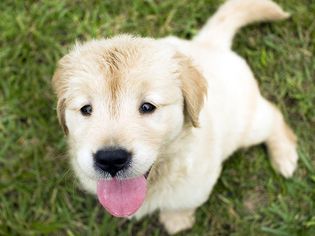
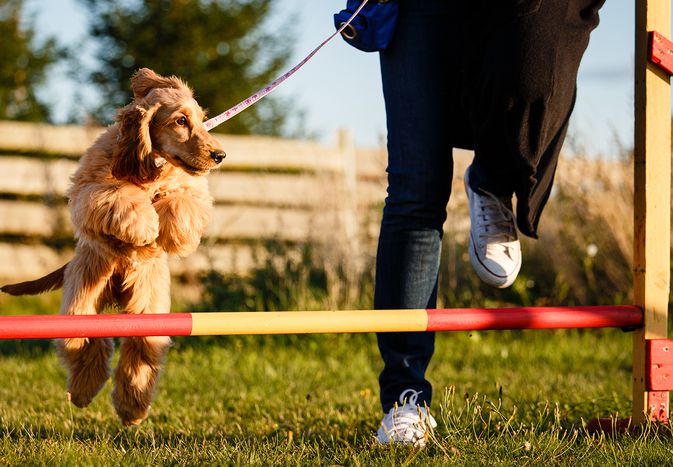
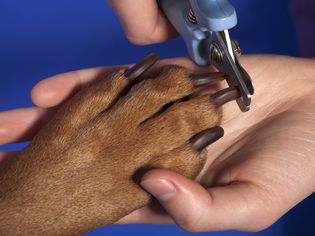
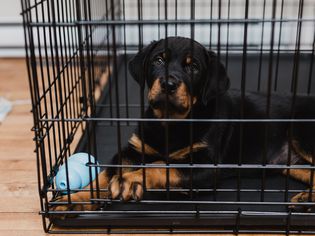
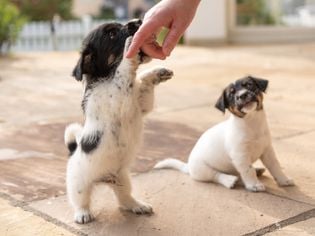
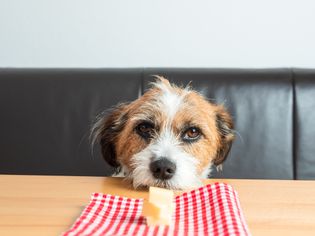
Comments on " Why Puppies Eat Poop and How to Stop It" :